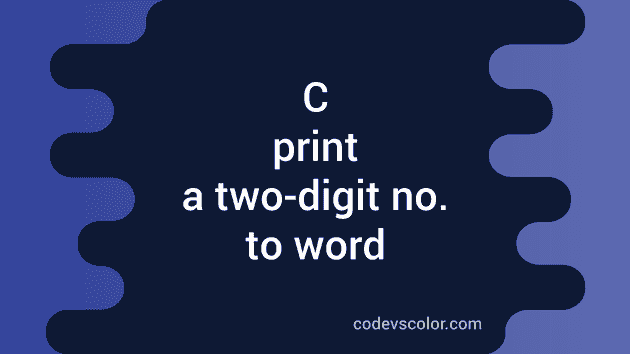C program to print a two-digit number to word:
In this post, we will learn how to print a two-digit number to word. It will be a human readable word. For example, if the input number is 11, it will print eleven and if it is 20, it will print twenty.
Algorithm:
The idea is to break the number to digits.
- We will read the first and the second digits in two different variables.
- Based on the first digit, we can guess the word to print.
- If the first digit is 1, we will read the second digit and based on it, we will print the number in word.
- If the first digit is not 1, we will print the word for that digit e.g. twenty for 2, thirty for 3 etc., and based on the second digit, we will complete the word.
C program to print two-digit number in word:
Below is the complete program that takes one number as input from the user and print that number in words.
This program will work only for two-digit numbers.
#include <stdio.h>
void printIfFirstDigitOne(int secondDigit)
{
if (secondDigit == 0)
{
printf("Ten");
}
else if (secondDigit == 1)
{
printf("Eleven");
}
else if (secondDigit == 2)
{
printf("Twelve");
}
else if (secondDigit == 3)
{
printf("Thirteen");
}
else if (secondDigit == 4)
{
printf("Fourteen");
}
else if (secondDigit == 5)
{
printf("Fifteen");
}
else if (secondDigit == 6)
{
printf("Sixteen");
}
else if (secondDigit == 7)
{
printf("Seventeen");
}
else if (secondDigit == 8)
{
printf("Eighteen");
}
else if (secondDigit == 9)
{
printf("Nineteen");
}
}
void printFirstDigit(int firstDigit)
{
if (firstDigit == 2)
{
printf("Twenty");
}
else if (firstDigit == 3)
{
printf("Thirty");
}
else if (firstDigit == 4)
{
printf("Forty");
}
else if (firstDigit == 5)
{
printf("Fifty");
}
else if (firstDigit == 6)
{
printf("Sixty");
}
else if (firstDigit == 7)
{
printf("Seventy");
}
else if (firstDigit == 8)
{
printf("Eighty");
}
else if (firstDigit == 9)
{
printf("Ninety");
}
}
void printSecondDigit(int secondDigit)
{
if (secondDigit == 1)
{
printf("-one");
}
else if (secondDigit == 2)
{
printf("-two");
}
else if (secondDigit == 3)
{
printf("-three");
}
else if (secondDigit == 4)
{
printf("-four");
}
else if (secondDigit == 5)
{
printf("-five");
}
else if (secondDigit == 6)
{
printf("-six");
}
else if (secondDigit == 7)
{
printf("-seven");
}
else if (secondDigit == 8)
{
printf("-eight");
}
else if (secondDigit == 9)
{
printf("-nine");
}
}
void printInWords(int firstDigit, int secondDigit)
{
if (firstDigit == 1)
{
printIfFirstDigitOne(secondDigit);
}
else
{
printFirstDigit(firstDigit);
printSecondDigit(secondDigit);
}
}
int main()
{
int firstDigit, secondDigit;
printf("Enter the number: ");
scanf("%1d%1d", &firstDigit, &secondDigit);
printf("You have entered: ");
printInWords(firstDigit, secondDigit);
return 0;
}Here,
- firstDigit and secondDigit are two integer variables.
- The user entered number is stored in these variables. The first digit is stored in firstDigit and the second digit is stored in secondDigit.
- printInWords is the main method to print the number in words. We are passing the first and the second digit to this method to print it in words.
- This method checks if the first digit is 1 or not. If it is 1, it calls printIfFirstDigitOne.
- printIfFirstDigitOne takes the second digit and prints the number in words. It can print all numbers from 10 to 19.
- If the first digit is not 1, printInWords will call printFirstDigit and printSecondDigit methods. printFirstDigit method will print the first digit and printSecondDigit will print the second digit.
- This method checks if the first digit is 1 or not. If it is 1, it calls printIfFirstDigitOne.
If you run this program, it will print output as like below:
Enter the number: 98
You have entered: Ninety-eight
Enter the number: 11
You have entered: ElevenC program to print two-digit number in words using switch cases:
The above program uses if-else blocks to find and print the words. We can also use switch cases to do the same thing.
The below program uses switch-case to print two-digit numbers in words:
#include <stdio.h>
void printIfFirstDigitOne(int secondDigit)
{
switch (secondDigit)
{
case 0:
printf("Ten");
break;
case 1:
printf("Eleven");
break;
case 2:
printf("Twelve");
break;
case 3:
printf("Thirteen");
break;
case 4:
printf("Fourteen");
break;
case 5:
printf("Fifteen");
break;
case 6:
printf("Sixteen");
break;
case 7:
printf("Seventeen");
break;
case 8:
printf("Eighteen");
break;
case 9:
printf("Nineteen");
break;
}
}
void printFirstDigit(int firstDigit)
{
switch (firstDigit)
{
case 2:
printf("Twenty");
break;
case 3:
printf("Thirty");
break;
case 4:
printf("Forty");
break;
case 5:
printf("Fifty");
break;
case 6:
printf("Sixty");
break;
case 7:
printf("Seventy");
break;
case 8:
printf("Eighty");
break;
case 9:
printf("Ninety");
break;
}
}
void printSecondDigit(int secondDigit)
{
switch (secondDigit)
{
case 1:
printf("-one");
break;
case 2:
printf("-two");
break;
case 3:
printf("-three");
break;
case 4:
printf("-four");
break;
case 5:
printf("-five");
break;
case 6:
printf("-six");
break;
case 7:
printf("-seven");
break;
case 8:
printf("-eight");
break;
case 9:
printf("-nine");
break;
}
}
void printInWords(int firstDigit, int secondDigit)
{
if (firstDigit == 1)
{
printIfFirstDigitOne(secondDigit);
}
else
{
printFirstDigit(firstDigit);
printSecondDigit(secondDigit);
}
}
int main()
{
int firstDigit, secondDigit;
printf("Enter the number: ");
scanf("%1d%1d", &firstDigit, &secondDigit);
printf("You have entered: ");
printInWords(firstDigit, secondDigit);
return 0;
}If you run this program, it will give similar output.

